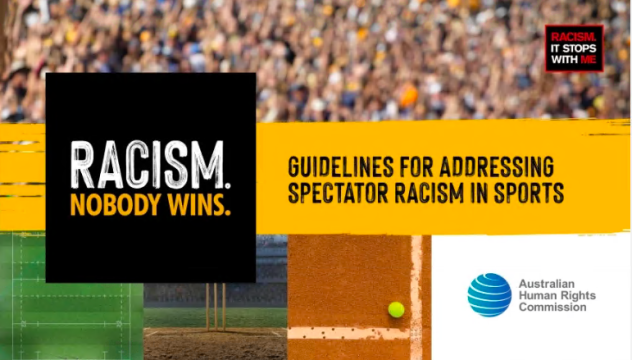Spectator Racism Guidelines
Sport holds a unique place in Australian society. It celebrates our values of equality, fairness and participation and helps build social connection and cohesion. However, spectator racism at sporting events remains an ongoing issue and can be difficult to address.
In April 2021, the Commission convened a roundtable with representatives from national sporting organisations and venues, and anti-racism experts, to discuss the ongoing issue of spectator racism. This led to the development of a set of guidelines for addressing spectator racism in sports.
These Guidelines are intended to promote best practice responses to spectator racism at the professional sporting level. They identify actions that can be taken consistently across sporting codes to ensure that spectators, officials, and players are safe, and aware of what to do and how to respond to incidents of spectator racism. They also propose proactive measures to prevent racism from occurring in the first place.
This project is one part of an important conversation about racism in sports. The Commission hopes this conversation will be an iterative one, and intends to work with diverse stakeholders including players, players associations, sporting peak bodies, venues, clubs and codes.
Sporting organisations should be aware that racism at the institutional and systemic level undermines efforts to address spectator racism if it remains unaddressed. The Commission hopes the release of these Guidelines will spark important conversations about racism in sports.
Feedback during the development of these Guidelines indicated that sporting codes and venue operators want guidance that supports their policies, procedures and efforts to address racism. While the nature, prevalence and type of spectator racism may vary, there are common foundational elements for responding to racism where it exists.
To accompany the release of the Guidelines, the Commission has developed a suite of resources to support their implementation. These resources are a guide only and are designed to be adapted by sporting organisations for their particular context.
These materials are developed as part of the Racism. It Stops With Me campaign, which has often worked in partnership with sporting codes to promote anti-racism initiatives and support sports fans and participants to identify and challenge racism.
In developing these Guidelines, the Commission notes that experiences of racism can also intersect with other experiences of discrimination (e.g. discrimination on the basis of gender, age, disability or sexuality). Responses to racism should factor in the intersectional experience of those targeted and respond to the entirety of that harm.
Supporting resources
To support the implementation of the Spectator Racism Guidelines, the Commission has developed the following resources, which you can find here:


